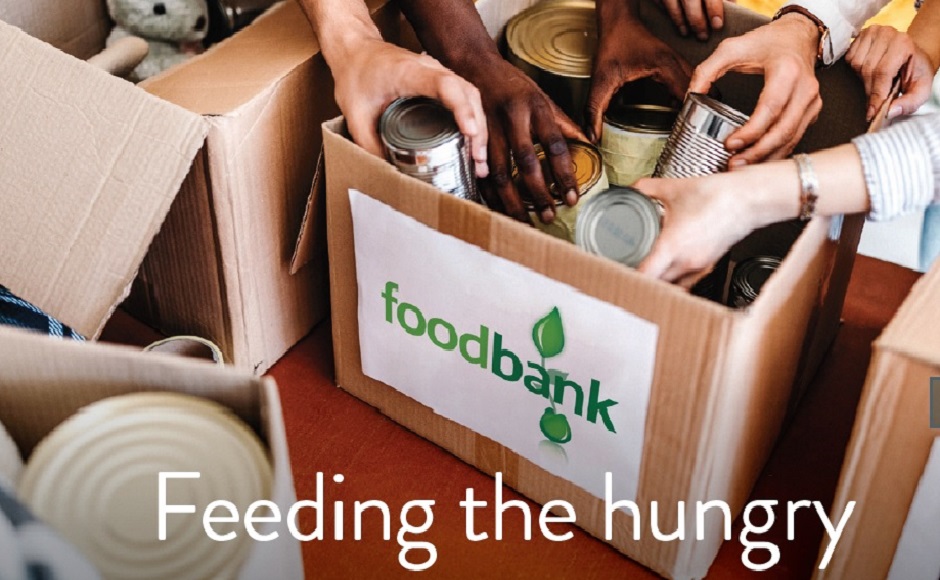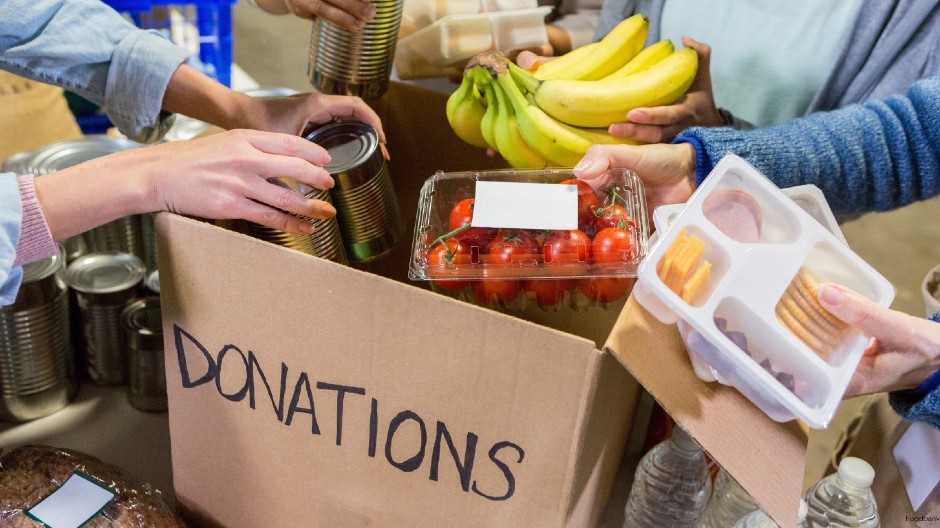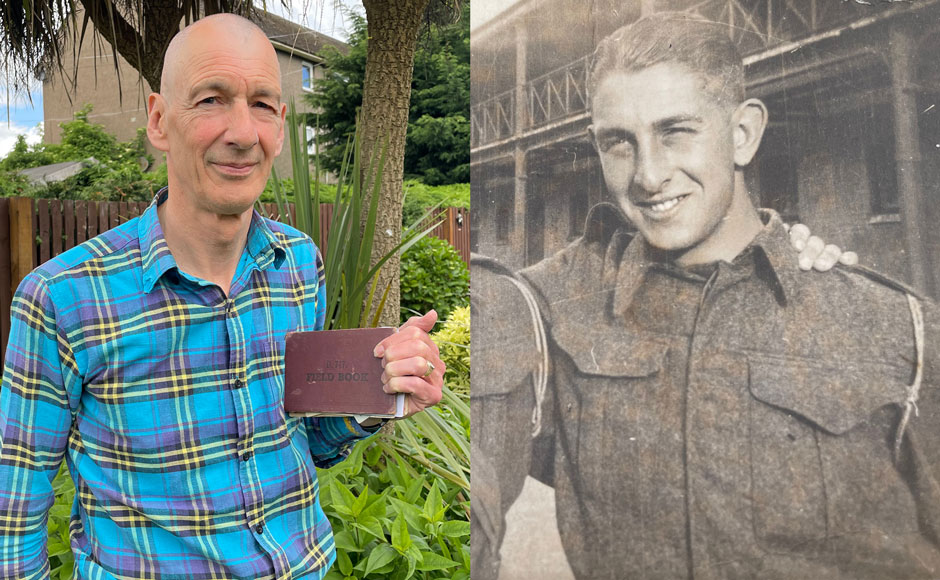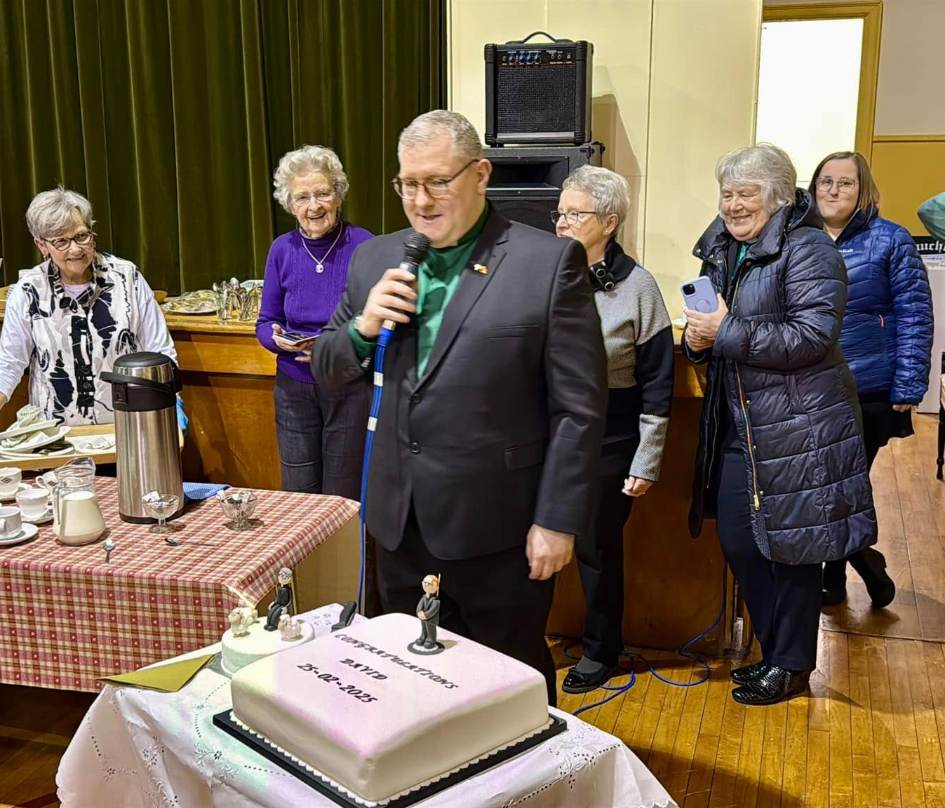Amid health crisis the Church is helping to feed the hungry
Published on 20 April 2020
Stewart Lowe describes the stark reality of life for visitors to the North East Edinburgh Foodbank in Leith for the latest issue of Life and Work magazine.

And so, the i's dotted and the t's crossed, we opened up for business. Signs were put up outside church halls, and we waited. It was October 2013.
Would people come? Had we misread the signs?
We had to be patient. A system was in place. We had to let the agencies get on with their work. The agencies knew who was hungry. They would refer hungry people.
And slowly at first, but certainly, they came.
Men came, single men. Thin. Slouched. Carrying the world on their shoulders. Drinking hot, sugary tea. Eating biscuits. One after the other. Some men need to talk. Some remain silent, giving nothing away, the mask of suspicion firmly in place. You can never tell who the talkers will be.
And the women. The old ones, old as your grandmother. Worn-out clothes. Young women. Full make-up. A face to greet the world. No matter how hard they try to disguise it, there is chaos in their eyes. Talking. Talking. Care homes. Marriage breakdown. Zero hours contracts. Drugs. Universal credit. Lives lived on the edge.
"I worked on a boat," the lady said, smiling, "a boat with huge sails. Took disadvantaged children around Great Britain. That was before alcohol came into my life, knocking at the door. I let it in, the devil in a bottle."
And the children. Babies in buggies. Loading the buggies with tins. Move over, kid, a tin of soup to rest your head against. All the time a mental equation going on in mum's mind, a slow release of worry as the weight of food increases and as the weight of food grows, the worry lessens, hidden, for a short time, behind a cloud.
With food in your belly – never really full, never a meal you'll remember, nothing worth writing home about – you can begin to think about other things, your hair, the washing, the colour of the sky, tomorrow.
The food bank van sidles along the narrow road of Madeira Place, half-on, half-off the pavement. It is a peaceful street, a place where you feel it is okay to stop and think. On Ferry Road, some hundred yards away, the traffic never ceases. The noise addles the brain. Here, on this old lane, things are different.
Three men ease themselves down from their perch in the van. It might be a parody of "New Tricks", these old geezers not gathered to solve ancient crimes but come together to feed hungry people.
The van is full to bursting with donations collected from Tesco and Asda and Boots. The kind people of Leith know why their heart is alive and why they are needed.
The buzzer rings as though it might come through the wall.
"That'll be Arthur," says Ellen, readying a long table for the gathered boxes of food to be sorted out.
Arthur, Rob and Lyall burst into the room. They are no spring chickens but they refuse the easy life. Not for them the big chair and the newspaper. They are determined to snap at the heels of Time. Their laughter fills the room. The barrow is loaded with crates of food. Their movement is purposeful and joyful. It is, altogether, fantastic.
"These boxes are from Tesco," says Lyall.
The boxes are lifted on to the scales.
"14 kilo."
More boxes. A relay of donated food and toiletries.
"12 kilo."
"A heavy one. 21 kilo."
And it happens, week in, week out, this gathering of food, a harvest of giving which never ends.
The empty van is soon restored to its filled state with the orders from the five churches which serve the community. A centre is open every morning or every afternoon from Monday to Friday. The van bumps down from the pavement and sets off, weaving in and out of the streets of Leith, the dropping points familiar as old friends.
A man enters and slides awkwardly down the one-inch slope into the foodbank. He is taken aback by the gentle awkwardness of his entry. The surprise on his face takes away any semblance of the embarrassment he has been holding close to his heart.
I clasp his hand and smile. I wonder how the room looks to his fresh eyes, the tables and chairs, the food in different stages of preparation.
Does he catch sight of the old Labrador hiding, briefly, under a table? How will he respond to the lively banter amongst the ancient crew?
He hands over his voucher which entitles him to a box of food.
"I can see you are hungry," I say.
"I haven't eaten for two days."
I land the box of food at his feet. His eyes show amazement.
I can hardly get through three hours without feeding. I am embarrassed by this fact. I can hardly think about the cupboards at home which are full to bursting and the fridge packed with all kinds of fresh produce. The world beyond the tin. The world where you can choose when and what you eat.
"What a weight of food."
He accepts the carrier bags and pauses to drink his tea.
"I've just come out of prison."
"Do you get help to get back on your feet?"
"No, I'm on my own."
He has sunken cheeks and eyes deep in his head. His sallow skin hints at trouble lying beneath the surface.
In the end, I am a man talking to another man, here in the food bank. Honesty, of necessity, is our currency. To stand close to a stranger and look into his eyes and see real hunger is to feel a deep sense of shame.
In the end, his fill of tea taken, he gathers up his bags and I lead him to the door.
I send him off.
Another client enters. All attention focusses on gathering up the toiletries and extras which accompany the box of food.
A lady from Malawi. She has been before. A fussy lady. She knows what she wants. Not this, but that.
We are laughing about the farce that parliament has turned into.
"In Malawi, "she says, "You can say nothing."
She is a very open person. She tickles the dog who lays his noble head in her lap.
"It is too dangerous."
Suddenly I feel I know nothing of the world. All my theories about this and that amount to nothing. I have never been truly hungry, truly silent, truly cold, truly alone, truly frightened.
Perhaps, that is what it is all about. Perhaps, that is the essence of the parable of the Good Samaritan. Being open to finding out how little you know. Not being scared to learn that what you thought was the way of things turns out not to be the case.
I have talked to primary school children about the foodbank. Little ones seated before me in their hundred, parents and grandparents assembled at the back and teachers watching from the sidelines.
"What do you like for tea?" I ask.
Hands go up.
"Pizzas."
"Chips."
"Burgers."
As the answers are given, I empty a box of food prepared for a single person along the front of the hall, tinned eating in all its many manifestations; beans, soup, pasta, rice, meat, fish, tomatoes, pasta sauce, vegetables, custard, fruit, tea bags, coffee, cereal, biscuits, long life milk and juice. Stuff that doesn't go off.
"Well, I have none of the things you like to eat."
The box takes on an aura of disappointment in the eyes of the children. I can see their attention quickly dwindle. The children wouldn't cross the road for the contents of such a box.
I settle a prop upon the table. It is a cardboard box doctored to resemble a cupboard with a tatty door knob attached. When I try to open the cupboard, the handle falls apart and the kids laugh. I run my hand around the insides of the box looking puzzled like the stage magician who has disappeared his beautiful stage assistant.
"Nothing," I say, "not a bean. How must a mum feel when she looks inside her cupboard to find it completely empty and her children are due back from school?"
An empty cupboard is the scaffolding of your life toppling about your ears.
I look at the faces of the audience and wonder, is there a child, is there a mother who recognises the situation?
A man I meet at the foodbank has long been in my thoughts. He is a warm-hearted, honest man whose troubles run deep. He lives in a cold flat and as winter approaches he surrenders his living room, he and his cat, and sets up camp in his bedroom. The damp seeps through the walls, a silent enemy, waiting to pounce.
There are times when he cannot face the world and he makes do with his guitar. He writes songs and will take them to open-mike venues when his head is in the right place.
As a teenager he was uprooted from his home in North Berwick and placed in a children's home in Craigmillar.
He found solace in the dangerous world of alcohol which offered the illusion of happiness. He is reluctant to accept food.
"If only you can feed my cat," he says.
He looks into my eyes.
I feel his pain.
All I can do is feed him and his cat.
The session is over.
The door is closed. The hoover runs over the carpet. Tables are clattered into shape and stored away. The food is hidden under blue blankets until the next time.
The old Labrador dog knows the routine. He has been here Friday morning and Monday evenings for six years.
You would need a library to house the stories he could tell.
Movement flattens to stillness.
The hungry will always be with us.
But this thing, this foodbank, is neither a house we are building nor a symphony we are composing. We have to accept that the finishing line is not of our own making. The finishing line, if it exists, lies in the hands of powers we have no control over. We don't cause the hungry people and we cannot bring that hunger to an end.
I release the foodbank sign from its slot above the doorway and pause to look up and down the street. The history of a place depends upon what the writer believes to be important. Many histories are never told.
For me and my team another morning is over. For the client of the foodbank it goes on, somewhere, becoming a new beginning.
Life and Work is committed to keeping our Christian community connected, and so in these exceptional times you can access the May issue of the Church of Scotland magazine on their website. If you enjoyed this article you can continue your connection with Life and Work and benefit from the full print or digital experience by subscribing here.


